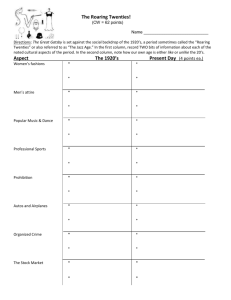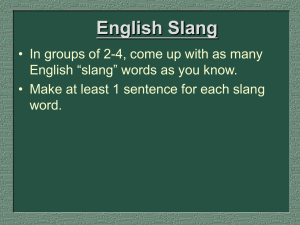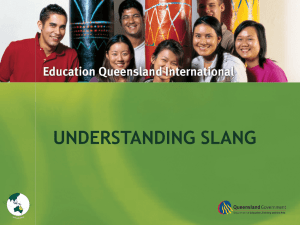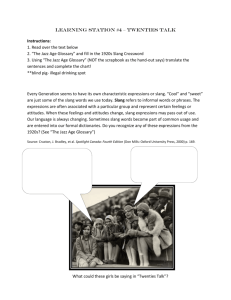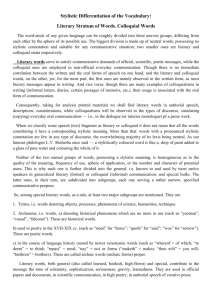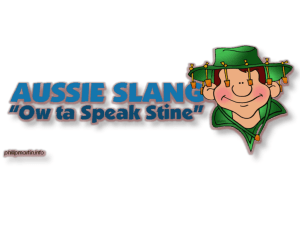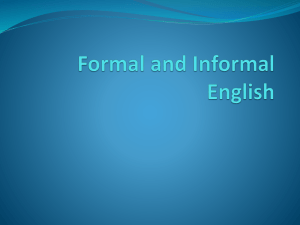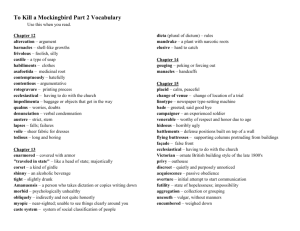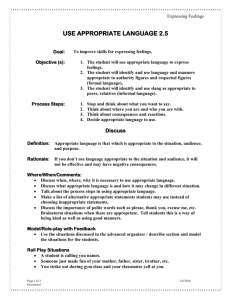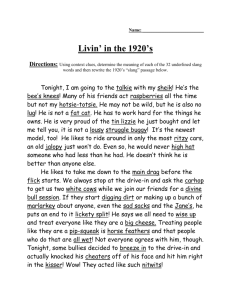2. The Formal Layer of English Vocabulary
advertisement
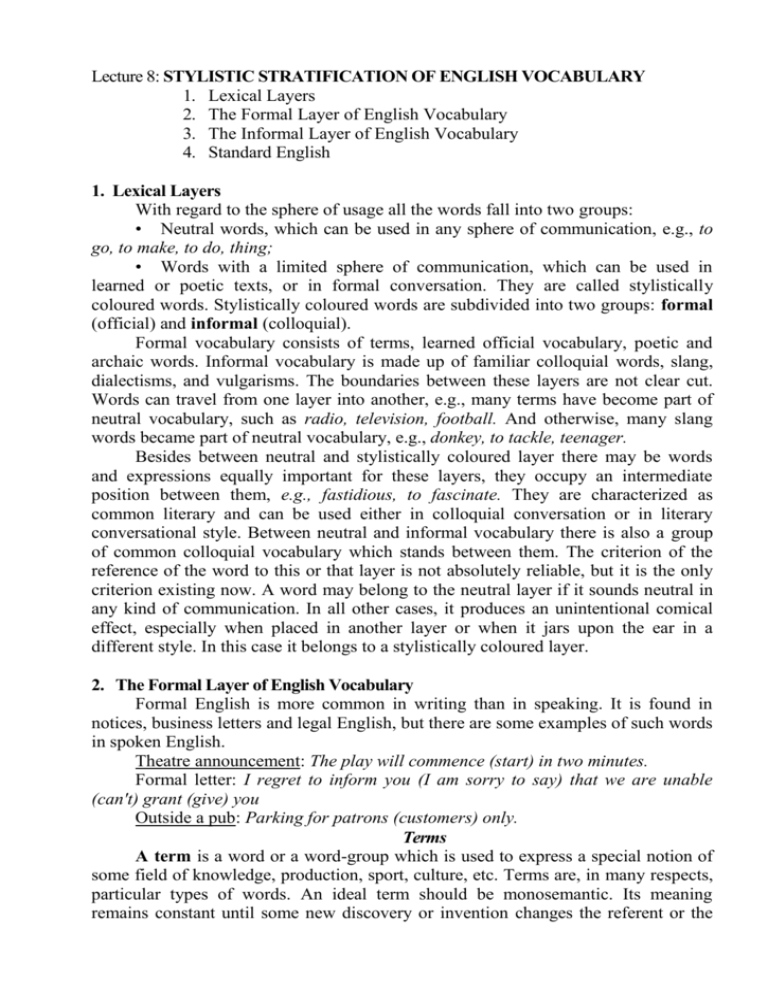
Lecture 8: STYLISTIC STRATIFICATION OF ENGLISH VOCABULARY 1. Lexical Layers 2. The Formal Layer of English Vocabulary 3. The Informal Layer of English Vocabulary 4. Standard English 1. Lexical Layers With regard to the sphere of usage all the words fall into two groups: • Neutral words, which can be used in any sphere of communication, e.g., to go, to make, to do, thing; • Words with a limited sphere of communication, which can be used in learned or poetic texts, or in formal conversation. They are called stylistically coloured words. Stylistically coloured words are subdivided into two groups: formal (official) and informal (colloquial). Formal vocabulary consists of terms, learned official vocabulary, poetic and archaic words. Informal vocabulary is made up of familiar colloquial words, slang, dialectisms, and vulgarisms. The boundaries between these layers are not clear cut. Words can travel from one layer into another, e.g., many terms have become part of neutral vocabulary, such as radio, television, football. And otherwise, many slang words became part of neutral vocabulary, e.g., donkey, to tackle, teenager. Besides between neutral and stylistically coloured layer there may be words and expressions equally important for these layers, they occupy an intermediate position between them, e.g., fastidious, to fascinate. They are characterized as common literary and can be used either in colloquial conversation or in literary conversational style. Between neutral and informal vocabulary there is also a group of common colloquial vocabulary which stands between them. The criterion of the reference of the word to this or that layer is not absolutely reliable, but it is the only criterion existing now. A word may belong to the neutral layer if it sounds neutral in any kind of communication. In all other cases, it produces an unintentional comical effect, especially when placed in another layer or when it jars upon the ear in a different style. In this case it belongs to a stylistically coloured layer. 2. The Formal Layer of English Vocabulary Formal English is more common in writing than in speaking. It is found in notices, business letters and legal English, but there are some examples of such words in spoken English. Theatre announcement: The play will commence (start) in two minutes. Formal letter: I regret to inform you (I am sorry to say) that we are unable (can't) grant (give) you Outside a pub: Parking for patrons (customers) only. Terms A term is a word or a word-group which is used to express a special notion of some field of knowledge, production, sport, culture, etc. Terms are, in many respects, particular types of words. An ideal term should be monosemantic. Its meaning remains constant until some new discovery or invention changes the referent or the notion. Being mostly independent of the context, a term can have no contextual meaning. A term is intended to ensure a one-to-one correspondence between morphological arrangement and context. No emotional colouring can be possible when the term is used within its proper sphere. A term can obtain a figurative or emotionally coloured meaning only when taken out of its sphere and used in literary or colloquial speech. Every branch of science develops its own special terminology. Special terminology is not only a mere sum of terms but a definite system reflecting the system of its notions. Terminological systems may be regarded as sets of terms belonging simultaneously to several terminological systems. Terms are not separated from the rest of the vocabulary. With the development of science and technology special terms have become known to everybody. Are we justified to call such words as vitamin, sedative, inoculation, antenna, software, hardware terms? In this respect, many terms can lose their specific terminological character and become similar to all common words of the language. The origin of terms shows some general sources: • Formation of terms from terminological phrases by means of clipping, blending, abbreviation, e.g., transistor receiver – transistor – trannie; television text – teletext; ecological architecture – ecotecture; extremely low frequency – ELF; • The use of combining forms from Latin and Greek like cyclotron, microfilm, supersonic, telegraph, telemechanics; • Borrowing from other terminological systems within the same language. Sea terminology, for example, lent many words to aviation vocabulary, which in its turn made the starting point of space terminology. Learned Words and Official Vocabulary In addition to terms, there is a considerable part of learned words, such as approximately, indicate, include, initial, feasible etc. This layer is especially rich in adjectives. All learned words have their everyday synonyms. The learned layer of vocabulary is characterized by lexical suppletion. This term is used for pairs like: Mouth – oral; Nose – nasal; Eye – ocular; Mind – mental; Son – filial; Ox – bovine; Worm – vermicular; House – domestic; The Middle Ages – medieval; Book – literary; Moon – lunar; Sun – solar; Star – stellar/sideral; Town – urban; Man – human; Money – monetary/pecuniary; Letter – epistolary; School – scholastic. All these adjectives can characterize something through their relation to the object named by the noun. There exist also adjectives of the same root. The learned vocabulary comprises: • some archaic connectives not used elsewhere, e.g., hereby, hereafter, hereupon, whereafter, wherein, whereupon; • double conjunctions, e.g., moreover, furthermore, however, such as; • group conjunctions, e.g., in consequence; • set expressions used in academic texts, e.g., as follows, as early as, in terms of. Learned official words have their neutral equivalents, e.g., Accommodation – room; Comestibles – food; Conveyance – carriage; Dispatch – send off; Donation – gift; Forenoon – morning; Summon – send for; Sustain – suffer. Poetic Diction There is no such thing as one poetic style in the English language. The language a poet uses is closely connected with his or her outlook and experience. There are words in English that have been traditionally used only in poetic texts. These words have poetic connotations. Their usage was typical of poetic conventions in the 18th and 19th centuries. Nouns: array – clothes; billow – wave; brine – salt water; gore – blood; Verbs: behold – see; deem – think; slay – kill; Adjectives: fair – beautiful; hapless – unhappy; lone – lonely; murky – grim; Adverbs: anon – presently; nigh – almost; oft – often; Pronouns: thee – you; aught – anything; naught – nothing; Conjunctions: albeit – although; ere – before. 3. The Informal Layer of English Vocabulary Informal vocabulary is used in one's immediate circle: family, relatives or friends. One uses informal words when at home or when feeling at home. Informal language is more common in spoken English than in written English. Informal style is relaxed, free-and-easy, familiar, and unpretentious. But informal talk of well-educated people considerably differs from that of the illiterate or the semi-educated; the choice of words with adults is different from the vocabulary of the teenagers; people living in provinces use certain regional words and expressions. The choice of words is determined in each particular case not only by an informal or formal situation, but also by the speaker's educational and cultural background, age group and his occupational and regional characteristics. Informal words are traditionally divided into three types: colloquial, slang and dialect words. Colloquial and Literary Colloquial Words Colloquial words are used by everybody, their sphere of communication is wide. Literary colloquial are informal words that are used in everyday conversational speech both by cultivated and uneducated people of all age groups but mostly older generation. The sphere of communication of literary colloquial words also includes the printed page. Vast use of informal words is one of the prominent features of the 20th century English and American literature. Literary colloquial words are to be distinguished from familiar colloquial. The borderline between the literary and colloquial is not always clearly marked. The number of speakers using familiar colloquial is more limited: these words are mostly used by the young and the semieducated. It is more emotional and more free. Familiar and literary colloquial words have some features in common: • Only a small number of words are in actual use, these words are highly polysemantic. • Words of broad meaning are very frequent. • There are a lot of readymade formula. • Set expressions are very frequent. • Many phrasal verbs are informal. • For these layers are also typical: nouns converted from verbs, converted verbs, substantivized adjectives, words derived by composition or substantivation, intensifiers are very frequent. Slang Slang includes expressive, mostly ironical words serving to create fresh names for those objects which are often mentioned in speech. These objects belong to money, class, drugs, drinking, music, modern dance, people. Slang helps to make speech vivid, colourful and interesting. It is mainly used in speech, but it can also be found in the popular press. It can be risky for someone who is not a native speaker to use slang: • Some slang expressions can cause offence to some sections of the population. • Slang words date very quickly. Different generations used different slang expressions. The following words were used to say that something was "wonderful" at different periods of time: Pre-war – top-hole; 1940s – wizard; 1960s – fab, groovy; 1970s – ace, cosmic; 1980s – brill, wicked. Slang can be general and special. General slang words are figurative words and expressions of emotional and evaluative colouring generally understandable and widely spread in colloquial speech. General slang has a range of peculiar features: • General slang is widely spread and understandable for all social strata of the society. • General slang has a marked emotional and evaluative character with the predominance of the expressive function over the nominative one. • General slang is relatively stable. • General slang is heterogeneous. • General slang has phonetic, morphological and syntactic peculiarities. Special slang words are words or expressions of this or that class jargon. Some particular types of special slang: • Cockney - has a rhyming structure, e.g., Trouble and strife, Apples and pears, Cain and Abel, Lean and lurch; • Back slang - secret language used to communicate with each other with the help of peculiar code unfamiliar to other people, e.g., police – slop, woman – namow, market – tekram, yes – say, took – cool, good – doog; • Centre/Medial slang. This form of slang appeared later than back slang. The concealing of the form goes not through turning over the most important words, but through splitting these words half by half on a vowel or diphthong and putting its first part before the second. Sometimes the sound [h] is added at the beginning of a new word or suffixes -mer, -fer, -ее, e.g., mug – hugmer, flat – hatfer, language – anguaagela, sweet – eetswe, fool– oolfoo. Dialectisms Dialectisms are words used by a subgroup of speakers of the language. The word croft is a word used in parts of Scotland for the houses of tenants on an estate. This is a regional dialect word. In the southern provinces of Otago and Southland in New Zealand, locals may call a holiday cottage a crib, while northerners call it a bach. When authors convey the regional dialect speech of their characters they use dialect words. If an author chooses a word which is spoken only in the area in which his story is set, then what the character says may be obscure to the reader, whereas if the words are common in other dialects, then the regional flavour of the speaker may not be clear. Analyze the following abstract: "Bide a bee – bide a wee; you southrons are aye in sic a hurry, and this is something concerns yourself an ye wad takpatience to hear't – Yill? – deil a drap о 'yill did Pate offer me; but Mattie gae us baith a drap о 'skimmed milk, and ane о 'her thick ait jannocks, that was a wat and raw as a divot. – O, for the bonnie girdie-cakes о 'the North! – and sae we sat doun and took out our clavers". Dialect words remain outside the literary norm, but some words have penetrated into the neutral vocabulary. Authors who want to represent the social status of the speakers will often include social dialect words. Social dialect vocabularies are determined on the basis of the social class or status of the speaker. For example, what you call the toilet tends to be part of your social dialect. Some people might call it a loo. Specialist Vocabulary A speaker has a regional, social and ethnic dialect vocabulary because of where he or she comes from, either regionally, socially or ethnically. But every speaker is also in command of a number of specialist vocabularies that are related to particular interests and occupations. Doctors when they are speaking as doctors to other doctors or their patients, use some vocabulary items that are peculiar to their occupation. Rock musicians have also their special words. Here is a piece of scientific writing. Notice how difficult it is to understand because of the special technical vocabulary: Assuming conversions of gluons into sea quark-antiquark pairs, any gluon contribution is implicitly taken into account in the sea quark distribution. Jargon and Vulgarisms Specialized vocabulary that is incomprehensible to the general public is known as jargon when it is addressed to the general public. Technical terms sometimes enter the common vocabulary. Depending on their level of education and experience, many ordinary readers can understand them sufficiently to make sense of the passage in which they occur. For instance, software (computers), habeas corpus (law), leukaemia (medicine). Vulgarisms refer to 2 groups: expletives, abusive words and obscene words (dirty language, mostly taboo). 4. Standard English Neutral vocabulary, common literary words, common terms, on the one hand, and common colloquial words and expressions, on the other, form the so-called Standard English vocabulary. Standard English is the official variety of the English language spoken and understood everywhere where English is used. It is the variety of English that is taught at schools and universities, used by the press, radio and television. By Educated English we must not understand Standard English. Speakers of this kind of English do not necessarily submerge all signs of social or geographical origin. Their accent is often local or characteristic of the class. Educated English is spoken by all classes of people all over the world. This is the only kind of English that has the remotest chance of universality even in Great Britain.
